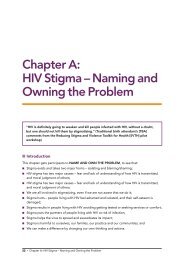Implementing Multiple Gender Strategies to Improve HIV and ... - ICRW
Implementing Multiple Gender Strategies to Improve HIV and ... - ICRW
Implementing Multiple Gender Strategies to Improve HIV and ... - ICRW
You also want an ePaper? Increase the reach of your titles
YUMPU automatically turns print PDFs into web optimized ePapers that Google loves.
Partner<br />
Organizations<br />
Implementation partners:<br />
• 300 CSOs <strong>and</strong> PSOs, e.g., Women Action Forum for Networking<br />
(WAFNET) <strong>and</strong> Western Women Empowerment Network (WWEN)<br />
• Ministry of Health, Kenya<br />
• National AIDS Control Council (NACC), Kenya<br />
Evaluation partner:<br />
• Swedish International Development Agency (Sida)<br />
IMPLEMENTATION AND RESULTS<br />
Start-up <strong>and</strong><br />
Implementation<br />
Process<br />
Program start-up included a formative assessment, program design <strong>and</strong><br />
planning, baseline survey, development of project management structures<br />
(grants technical review committees, program implementation team),<br />
establishment of field offices, <strong>and</strong> an initial call for grant applications.<br />
The program has provided technical support <strong>to</strong> more than 300 prevention,<br />
treatment, care <strong>and</strong> support grant recipients. Grants are awarded based<br />
upon capacity assessment of applicants <strong>and</strong> review <strong>and</strong> approval of<br />
applications by program teams <strong>and</strong> external grants technical review<br />
committees. CSO <strong>and</strong> PSO capacity is enhanced using the organizational<br />
development <strong>and</strong> systems strengthening approach, help with contract<br />
management, <strong>and</strong> strengthening of financial systems. Funded<br />
organizations are moni<strong>to</strong>red through periodic visits <strong>and</strong> review of submitted<br />
reports. The program also works <strong>to</strong> strengthen linkages among programs<br />
<strong>and</strong> between programs <strong>and</strong> government structures <strong>to</strong> enhance overall <strong>HIV</strong><br />
<strong>and</strong> AIDS programming.<br />
Local Involvement/<br />
Ownership<br />
Maanisha maintains strong partnerships with government structures,<br />
including the Ministry of Health <strong>and</strong> the NACC. By transferring skills<br />
through capacity-building activities with both individuals <strong>and</strong> organizational<br />
systems, the program aims <strong>to</strong> be sustainable. Within the capacity-building<br />
strategy, community members who are part of CSOs design <strong>and</strong> implement<br />
<strong>HIV</strong> <strong>and</strong> AIDS interventions of their choice.<br />
Evaluation<br />
Methodology<br />
• Formative needs assessment, 2004: Program implementers employed<br />
a participa<strong>to</strong>ry approach in conducting a formal needs assessment.<br />
They involved key stakeholders at all stages of study design, <strong>and</strong> data<br />
collection <strong>and</strong> in generating the conceptual framework for the five-year<br />
program. The needs assessment covered the following areas: 1)<br />
assessing the technical <strong>and</strong> organizational capacities of all<br />
organizations <strong>and</strong> agencies (health facilities <strong>and</strong> institutions, nongovernmental<br />
organizations, CSOs, <strong>and</strong> faith-based organizations)<br />
involved in <strong>HIV</strong> <strong>and</strong> AIDS activities in Nyanza <strong>and</strong> Western provinces of<br />
Kenya; 2) identifying the needs of vulnerable groups, such as people<br />
living with <strong>HIV</strong>, orphans, youth, widows <strong>and</strong> widowers; <strong>and</strong> 3)<br />
conducting stakeholder analysis <strong>to</strong> identify <strong>HIV</strong> <strong>and</strong> AIDS implementers<br />
<strong>to</strong> participate in the five-year program.<br />
• Baseline assessment, 2005: Maanisha has a full-fledged moni<strong>to</strong>ring<br />
<strong>and</strong> evaluation framework nested in the moni<strong>to</strong>ring <strong>and</strong> evaluation<br />
framework of the NACC. Evalua<strong>to</strong>rs administered cross-sectional<br />
Knowledge, Practice <strong>and</strong> Coverage surveys using household<br />
questionnaires <strong>to</strong> the adult <strong>and</strong> youth populations. Surveys investigated<br />
55
















